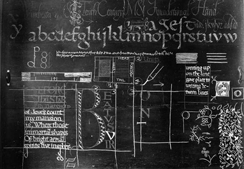In his closing plenary at this year’s CSCW, Bill Buxton made a provocative point about how to make a difference in the research world. His key point was that people often think of technology as alchemy, creating gold out of nothing. But alchemy (the creation of brand new ideas) is very hard and very rare, and is ultimately a fool’s game. Most progress comes not from alchemy but from prospecting, the recognition of good ideas that are already out there, the understanding of which ideas are ripe for exploitation and the ability to marshal the right resources to get them into the world. He quotes Alan Kay: “It takes almost as much creativity to understand a good idea as to have it in the first place.”

The example he gave was of the Blackboard, which was invented in 1801 and which Buxton claims revolutionized education more than every other technology introduced into schools since then put together. Before 1801 each child had his or her own slateboard, which he or she used to mark and correct answers before copying them down on paper. Buxton noted as an aside the irony that we’re now trying to reintroduce slates into the classroom in the form of tablet PCs, but his main point was the fact that there’re very few differences between a slate and a blackboard: a blackboard is just a slate that’s been made an order of magnitude larger and hung on the wall. A technologist looking for novel innovation might overlook such a “minor” modification, and yet that slight change made all the difference.